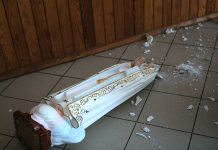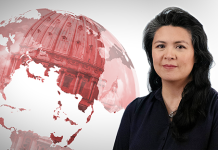You are not signed in as a Premium user; we rely on Premium users to support our news reporting.
Sign in or Sign up today!
SANTIAGO, Chile (ChurchMilitant.com) – Having languished in committee for the last five years, a bill to advance euthanasia in Chile is scheduled for debate in the nation’s Chamber of Deputies. The Catholic bishops of Chile issued a statement lambasting the development, saying that “euthanasia obscures the deep meaning of human dignity” and alluding to what Pope Francis has dubbed “the throw-away culture.”

In a 79–54 vote on Dec. 17, the lower house of Chile’s bicameral Congress approved a measure that would ensure “death with dignity” for patients diagnosed with emotional distress, mental illness or terminal physical illness. If passed, the new law would grant persons the right, subject to certain legal requirements, to decide on and request the medical means to end their lives. A diagnosis of terminal illness, for example, would have to be confirmed by two physicians. Additionally, patients must be conscious and in use of their full mental faculties — as certified by a specialist — in order to make the decision.
The bill would allow medical professionals the right of conscientious objection to euthanasia. The patient who decides to request euthanasia must designate one or more trusted persons of legal age (classified in order of preference and priority) to communicate the patient’s wishes to the doctor. If passed by Congress and signed by President Sebastián Piñera, the bill would make Chile the first country in Latin America to allow euthanasia. Eleven members of Piñera’s centrist National Renovation Party voted in favor.
The new law would allow persons the right to decide on and request the medical means to end their lives.
Liberal Party deputy Vlado Mirosevic claimed in a statement to local media that a “majority” of his fellow citizens believe “individual freedom must be above the current law that forces you to suffer.” Moreover, of the euthanasia legislation, Mirosevic said, “It is a triumph of the secular State, a triumph of freedoms and it is a triumph of tolerance.” Mirosevic said that euthanasia would be allowed for sufferers of “terminal illness or painful illness and, in the case of how we understand that suffering, whether it is psychological or physical.”
National Renovation Party deputy Andrés Celis warned against allowing euthanasia in cases of mental illness, saying, “What we are approving is the most extensive I have seen, even in legislation like the Netherlands, which is the most extreme example we currently have, which worries me.” Celis said that he favors investing in “public resources in favor of life so that a person may have a good death,” rather than providing the drugs to induce death.
Chile’s Catholic bishops stated that euthanasia always violates the inherent rights of every human being and is but a modern form of violating fundamental human rights.
The bill also establishes that patients may establish an advance-directive document to express a preference for medically assisted death in the future. The chamber rejected a motion to allow voluntary euthanasia for those ages 14 and above. The current bill is scheduled to be debated by the deputies in May, which will then pass it on to the Senate.
A week after deputies advanced the bill, Chile’s Catholic bishops stated that euthanasia always violates the inherent rights of every human being and is but a modern form of violating fundamental human rights. “With euthanasia, the deep meaning of human dignity is obscured, making it appear as if it leads to subjective well-being. In this way, human dignity is reduced to a simple good available like others,” warned the bishops. The underlying philosophy, they said, considers human life as disposable, treating the marginalized as waste or surplus.

“Those who pay the cost of this logic are precisely the most fragile and many times the poorest people, with respect to whom we, as a society, have the greatest obligation,” read the statement. The statement from the bishops claimed that the Church is always spiritually close to those who suffer and accompanies their family members. The bishops said that “all possible instances of relief, especially palliative care,” should be promoted and reach “as many people as possible, especially the poorest.”
“There is no reason that can morally legitimize an act as grave as voluntarily taking the life of any person, under any circumstances, including in the case when that person has given consent,” they said. Finally, they asked God to enlighten the hearts of legislators in the knowledge that taking “a wrong step in these areas always has dire consequences in the future, as history shows.”
Critics of the bill point out that the bill specifies that a “non-diagnostic” certificate issued by family doctor or mental health specialist is all that is necessary to ask for euthanasia. In addition, there is no required review committee to examine the finding of the physicians or specialists in favor of euthanasia; nor is there any requirement for keeping transparent accounts, as is the case in other countries such as Belgium and the Netherlands. Palliative care is guaranteed currently in Chile only in cancer cases but is defined as an alternative in the current bill rather than a requirement to access euthanasia. Critics fear that the door may be open to allowing euthanasia for minors, as is the case in Belgium and the Netherlands.

Writing for Community and Justice — a human rights lobby group in Chile — Vicente Hargous accused members of the Chamber of Deputies’ Committee on Health of treating physicians and others with disrespect during a hearing earlier this month. Writing on Jan. 7, Hargous noted that two palliative-care physicians who had been asked to appear were barred from giving complete testimony challenging the euthanasia bill. Hargous also noted that no palliative care physicians could speak in December when the chamber discussed advancing the bill.
Since late 2019, Chile has been rocked by a series of riots after leftists denounced fare hikes for Chile’s mass transit. In Nov. 2019, rioters torched the interior of a church in Santiago, the nation’s capital, and staged a mock execution of a Catholic priest. In April, voters will choose electors to draft a new national Constitution, which will be decided in a 2022 plebiscite. Voters will also choose a new president this year.
The prestige and influence of Catholic bishops received a serious blow in 2018, following revelations of serial sexual abuse and cover-ups by clerics, including a former cardinal. In May 2018, all of Chile’s bishops offered their resignations to Pope Francis. The pontiff had accused his brother bishops of “negligence” in handling sex abuse allegations while he also apologized for slandering those who accused Bp. Juan Barros of Chile of harboring sex abusers.
Writing in El Mercurio newspaper, Fr. Enrique Opaso of the diocese of Valparaíso lamented, “I spoke with legislators; I tried to influence them, to make our point of view known. … I needed the strength of the Church, but I could not find it. And I felt alone again, like a voice in the desert, just like so many Catholics.”
— Campaign 31877 —
Have a news tip? Submit news to our tip line.

We rely on you to support our news reporting. Please donate today.

























